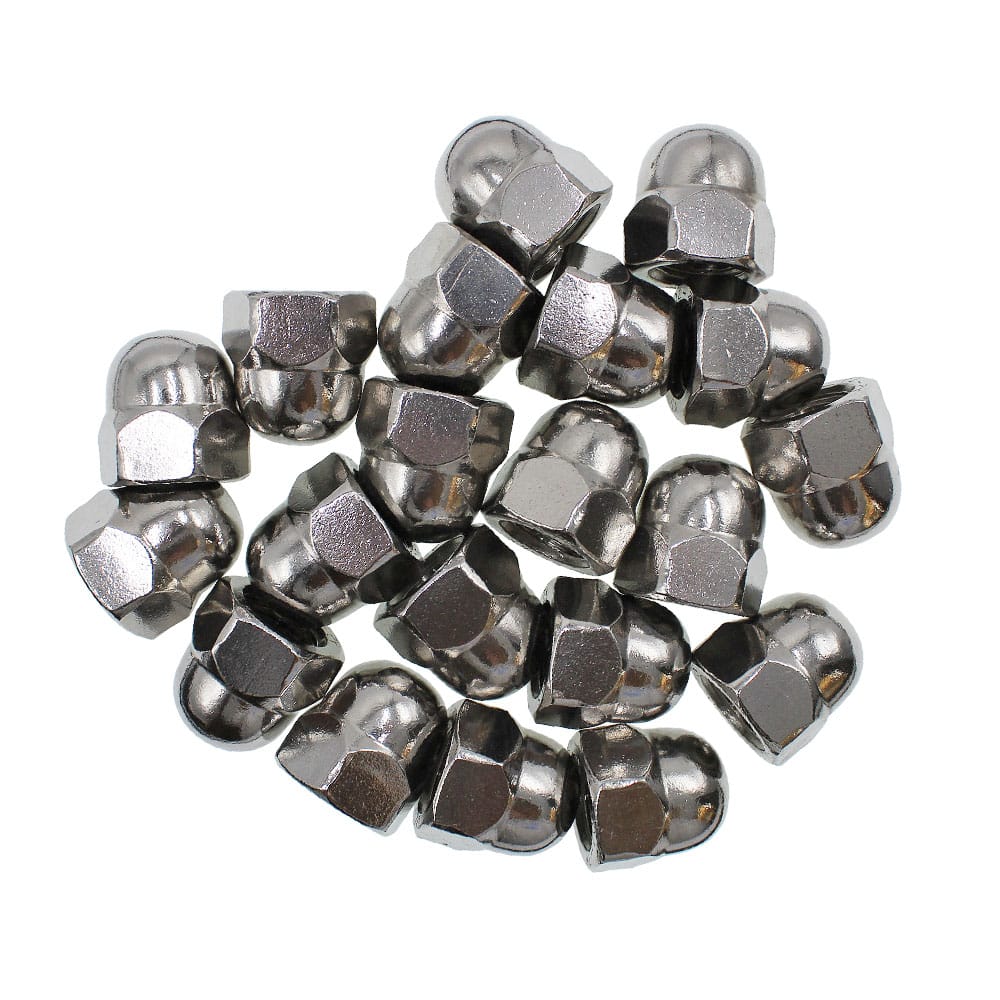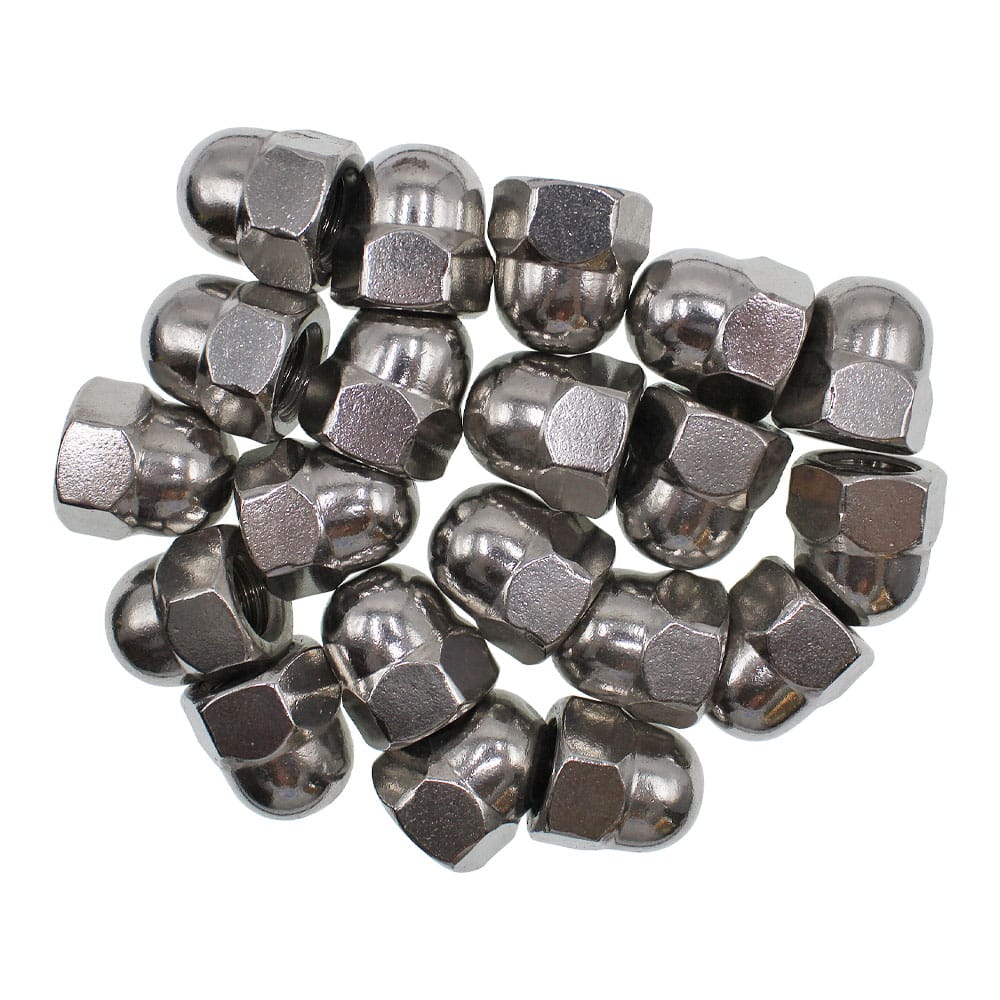- Massive Range
- FREE UK Delivery
- Rapid Dispatch
- Massive Range
- FREE UK Delivery
- Rapid Dispatch
- Massive Range
- FREE UK Delivery
- Rapid Dispatch
£9.99 – £14.99 inc VAT


This website is secured:
£ MULTIBUY SAVINGS – Order 3 For 10% Off
✔ Specialists In Rapid Shipments Of Any Size
✔ FREE UK Delivery Included
✔ Immediate Express Dispatch From Stock
✔ Tracked Delivery with Order Updates
✔ 30-Day Returns Accepted
@ ☏ Larger Pack Quantities Available
Are you on the lookout for a reliable and durable nut for your construction or DIY project? Look no further than the M6 Dome Nut! Made from high-quality A2 Stainless Steel 304 grade, this nut is built to last and endure all kinds of wear and tear. Its corrosion-resistant properties make it a go-to pick for those looking for a low-maintenance yet versatile option. Plus, the dome head ensures added security and stability.
Don’t settle for less when it comes to quality construction parts. Choose M6 Dome Nut by Speciality Metals, and get the job done right!

Top quality stainless steel m6 dome nut supplied straight from Warrington, UK.
The M6 Dome Nut by Speciality Metals is an excellent choice if you need a reliable and sturdy fastening solution. This dome nut is constructed from high-quality A2 stainless steel of 304 grade to withstand most environmental conditions. As a result of its dome head design, it provides a secure grip and an elegant finish, making it an ideal choice for a variety of applications. No matter what you’re working on, this nut is designed to deliver durability and low maintenance. Furthermore, its corrosion-resistant properties make it suitable for harsh and corrosive environments. With the M6 Dome Nut, you can guarantee the safety and quality of your project.
Standard nuts are not as aesthetically pleasing as dome nuts.
Key product details:
Speciality Metals are the best suppliers for you because:
Speciality Metals is a trusted UK based distributor of fasteners, sheet metal, flat bar and round tube. We specialise in rapid delivery to any location around the country. Our team of experienced, friendly staff are at hand at all times to process your order.
Cleaning: First, thoroughly clean the dome nuts to remove any grease, dirt or corrosion. This can be done with a degreaser or a mild detergent.
Sanding: Lightly sand the surface with fine-grit sandpaper to create a slightly rough texture. This helps the paint adhere better to the smooth stainless steel surface.
Primer: Apply a metal primer designed for stainless steel to improve paint adhesion and corrosion resistance. Some primers are spray-on, while others need to be applied with a brush.
Type of Paint: Use a paint that is compatible with metal surfaces and the environment in which the nut will be used. Epoxy paints are generally durable and offer good adherence to metal surfaces.
Application: Apply the paint in thin, even coats, allowing adequate drying time between coats as specified by the paint manufacturer.
Spray vs Brush: A spray paint can offer a more uniform coat, but brush application can work well for small quantities.
Safety: Make sure to work in a well-ventilated area and wear appropriate safety gear, like gloves and a mask.
Mechanical Properties: Painting can add thickness to the nut, potentially affecting the fit and torque specifications.
Temperature Resistance: Make sure the type of paint you use can withstand the temperatures the dome nut will be exposed to.
Chemical Exposure: If the painted nut will be exposed to chemicals, oils or solvents, ensure the paint is resistant to these substances.
Aesthetics: Keep in mind that paint can chip or wear over time, especially in mechanical or outdoor applications, affecting the appearance.
Regulatory Guidelines: In some industries, painted fasteners must meet specific regulations, so be sure to consult any applicable guidelines or standards.
Stainless Steel 304 dome nuts don’t have a specific “shelf life” like perishable goods, but their longevity can be influenced by various factors. Proper storage in a dry, cool environment can help maintain their integrity, while exposure to conditions like high humidity or corrosive substances can degrade them over time. If the nuts have a protective coating, this too may deteriorate with time. Regular handling might introduce contaminants that could affect the nut’s performance. Even though Stainless Steel 304 is resistant to corrosion, it’s not entirely immune, and extended exposure to corrosive agents can have an impact. Some industries have regulations on the age of components, including fasteners, so it’s essential to consult any applicable guidelines. Additionally, it’s a good practice to inspect any dome nuts that have been in storage for an extended period for signs of wear or corrosion. Keeping records of purchase dates and batch numbers can also be useful, especially in critical applications where material traceability is essential.
Dome nuts, including those made of Stainless Steel 304, come with various types of threads to suit different applications. Here are some of the common types of threads you might encounter:
Unified National Coarse (UNC): This is a standard thread type commonly used in the United States. It has fewer threads per inch, making it quicker to assemble but less fine in its adjustment.
Unified National Fine (UNF): This type also originates from the U.S. and offers a finer thread, giving it better strength and making it more suitable for high-torque applications.
Metric Threads: These are standardized based on millimeter measurements and are commonly used internationally. The most common are the M-series, like M8, M10, etc., where the number indicates the nominal diameter in millimeters.
British Standard Whitworth (BSW): This is an older British standard that is less common today but still used in some applications. It has a specific thread angle and unique pitches.
British Standard Fine (BSF): Similar to BSW but with finer threads, BSF is also largely phased out but still in use in some vintage or specialised British equipment.
ISO Metric Coarse and Fine: These are international standards that are somewhat similar to the metric threads but have specific tolerances and dimensions as per ISO standards.
Pipe Threads: In some special applications, dome nuts may come with NPT (National Pipe Thread) or BSP (British Standard Pipe) threads designed for sealing pipe joints.
Left-Hand Threads: These are less common and are used in specific applications where the nut is subject to counter-clockwise rotation forces that might otherwise cause it to loosen.
Acme Threads: These are specialised threads used in applications like lead screws, where high load-carrying capacity is needed.
Trapezoidal Threads: Similar to Acme but based on metric dimensions, these are used for similar high-load applications but adhere to international standards.
Custom Threads: For specialised applications, custom thread profiles can be manufactured, though this is less common and often more expensive.
Stainless Steel 304 dome nuts are generally suitable for use in freezing conditions due to their good low-temperature properties. However, there are several considerations to keep in mind. The material can become slightly more brittle at low temperatures, although this is usually not a significant concern for most applications. Thermal contraction can affect the fit and torque settings between the nut and bolt, so adjustments may be necessary. If you’re using lubricants or anti-seize compounds, ensure they are rated for low-temperature use, as some can thicken or freeze. Additionally, if your assembly involves seals or gaskets, these should also be rated for low temperatures to maintain a secure fit. Corrosive agents can sometimes become more aggressive in cold conditions, so factor that into your material choice. Finally, it’s advisable to consult the manufacturer’s guidelines for specific information on using dome nuts in freezing conditions, particularly for critical or high-stress applications.
Yes, dome nuts made from Stainless Steel 304 are commonly used in automotive applications due to their excellent corrosion resistance, durability and mechanical strength. They are particularly useful in areas exposed to the elements or those requiring a cleaner, more finished look, such as visible engine components, license plate attachments or exhaust systems. These nuts are resistant to many of the chemicals and fluids found in vehicles, making them a reliable choice. In automotive settings, the ability to withstand vibration is also crucial, and the inherent mechanical strength of Stainless Steel 304 makes dome nuts well-suited for such dynamic conditions. However, it’s essential to ensure that the specific type of dome nut used meets the load and torque specifications for the automotive application in question. Consulting with engineers and adhering to industry standards can provide additional assurance that the chosen dome nuts are appropriate for their intended use in a vehicle.
Check out our blogs discussing A2 stainless steel dome nuts. It will prove a useful read to help you to make an informed decision on which material would work best for you.
We are also very proud of our ever expanding YouTube channel.
Our goal for our blogs, videos and help guides is to answer as many questions as possible to help to explain the possibilities of mesh to our customers. Contact us today if you have any questions at all. We are always really keen to help in any way that we can.
We are also very proud of our highly popular eBay store, check us out there too.
Thank you for checking out our product.


Speciality Metals
Unit 1, Farrell Street, Warrington,
Cheshire, WA1 2WW, United Kingdom
Quick Links
Payment Options
